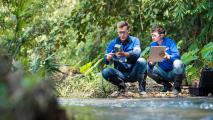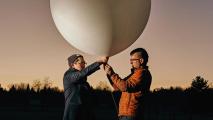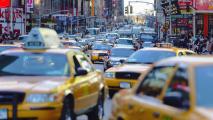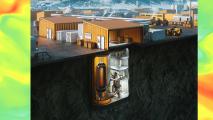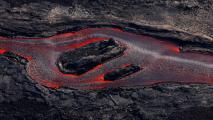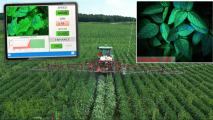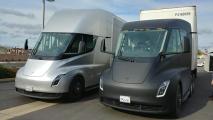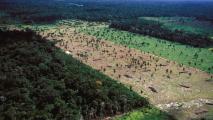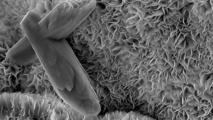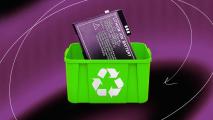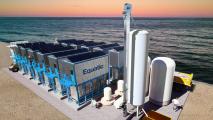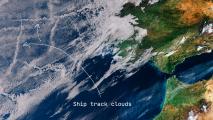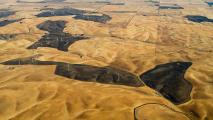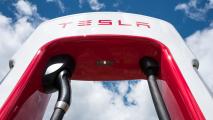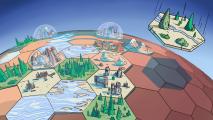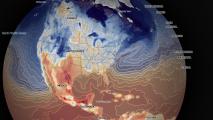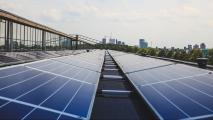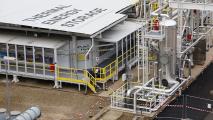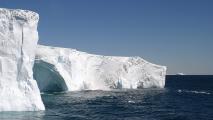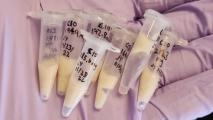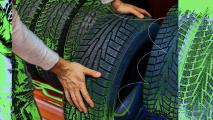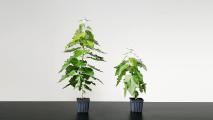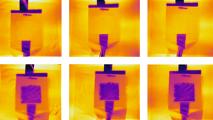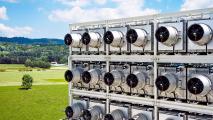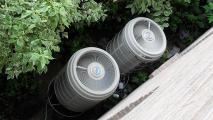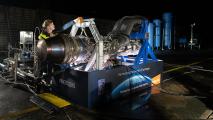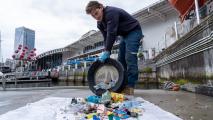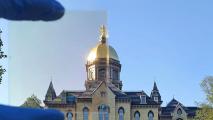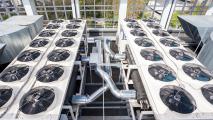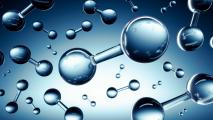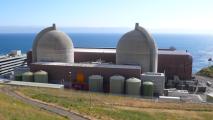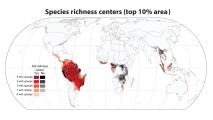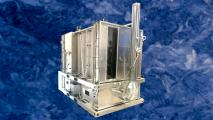Field: Climate Crisis
Three founders look to the future at Freethink’s inaugural Great Progression event
The tech community came together for the launch of the Great Progression event series, curated by Peter Leyden and produced by Freethink.
This startup is racing to mine the final frontier
AstroForge isn't afraid to take risks if it means being the first to mine asteroids for the rare metals we need for many clean energy technologies.
“Stopping climate change” is the wrong goal
Anything that matters to humans should be under our control. The climate matters—so we should control the climate.
These red-hot “green jobs” could help Gen Z cope with its eco-anxiety
"Green" jobs that help combat the climate crisis are on the rise, according to the World Economic Forum's Future of Jobs 2025 report.
Charting the evolution of nuclear energy
Nuclear fission’s stalled growth might give way to fusion’s clean energy potential
The startup using balloons to cool the planet
A look at the history of stratospheric aerosol injection (SAI), the arguments against it, and the startup putting it into action right now.
Desalination could avert one of the top 10 threats facing the world
Desalination — changing seawater into safe drinking water — could avert a crisis. Here's how to make it less costly and labor-intensive.
New York City greenlights congestion pricing
Here’s how New York City's congestion pricing is expected to improve traffic, air quality, and public transit.
Artificial reef designed by MIT engineers could protect marine life, reduce storm damage
An MIT team is hoping to fortify coastlines with “architected” reefs engineered to mimic the wave-buffering effects of natural reefs.
Your garden’s 2024 “hardiness zone” could change, thanks to warming climates
Hotter summers and warmer winters are changing the types of plants we'll be able to successfully grow. Here's how to adapt.
Scientists are deep-freezing corals to repopulate the ocean
Healthy corals could disappear by the 2030s if climate change is not curbed, so scientists are deep freezing specimens.
Nuclear’s role in a net-zero world
Is nuclear power a necessary part of the transition away from fossil fuels? As the debate rages on, new technologies may be shift the balance.
“Stone wool”: lava-based material is more efficient, lasts longer than most insulation materials
Stone wool, a lava-based material, is more efficient and lasts longer than today's most common insulation materials.
How one startup is using the ocean to fight climate change
California startup Ebb Carbon wants to build the world’s largest marine CDR plant to capture CO2 in Port Angeles, Washington.
Moving trees north to save the forests
Scientists are exploring how to adapt forests for climate change, transitioning them to a warmer future by planting new southern seedlings.
Reducing pesticide use while increasing effectiveness
AgZen has developed a system for farming that can monitor exactly how much of the sprayed chemicals adheres to plants, in real time.
9 ways AI is helping tackle climate change
Existing AI systems include tools that predict weather, track icebergs, and identify pollution, all of which can help fight climate change.
Doomerism’s “tipping point” and why existentialism isn’t the solution to the climate crisis
We can't afford to lose optimism over averting the worst consequences of this crisis; without it, we're trapped in a response of inaction.
AI for agriculture: How Indian farmers are harvesting innovation
India's farmers combat climate change, pestilence, and financial burdens, with AI-driven initiatives offering transformative solutions.
Google AI is searching the world for methane leaks from space
Google will provide computing resources to MethaneSAT, a project to identify climate-harming methane leaks from space.
Mega solar farms could make it rain in deserts
A new study suggests that gigantic solar farms could be used to create “heat islands” that make rain locally.
Battery electric trucks offer emission cuts of 75-85% over their entire life cycle
A civil and environment engineer weighs in on whether electric trucks are our best bet to cut road transport emissions.
Does it work to pay people not to cut the forest?
Evidence that paying people to save trees, preserve ecosystems and reduce carbon emissions is scarce. But it can succeed if it’s done right.
How much CO2 can the world emit while keeping warming below 1.5°C and 2°C?
Researchers estimate how much more CO2 we can emit to keep temperatures below 1.5°C and 2°C to combat climate change.
This startup wants to track soil carbon with AI and satellites
Boomitra’s remote sensing technology combines data from Earth and space to verify when carbon is coming out of the air.
Plants are likely to absorb more CO₂ in a changing climate than we thought – here’s why
New research shows that plants might take up more CO₂ than previously thought, but still can't do the heavy lifting to stop climate change.
This global prize competition is launching small moonshots to save the planet
Prince William’s “Earthshot” strategy hopes to hedge humanity’s bet and tackle multiple environmental crises.
A mineral produced by plate tectonics has a global cooling effect, study finds
Geologists have found that tectonic activity gives rise to smectite, a type of clay that can sequester a surprising amount of organic carbon.
How these wooden blocks could stop climate change
Bill Gates-backed startup Graphyte has unveiled Carbon Casting, carbon removal tech it says is cheap, scalable, and durable.
BlackRock invests $550M in world’s largest direct air capture plant
Money manager BlackRock has invested $550 million in STRATOS, the world’s largest direct air capture facility.
What Arizona and other drought-ridden states can learn from Israel’s pioneering water strategy
Israel’s approach to desalination offers insights that Arizona would do well to consider for managing droughts.
New low-carbon cement is stronger than the regular stuff
A low-carbon cement developed by two MIT grads has officially exceeded industry standards for strength, durability, and more.
Reflecting sunlight to cool the planet will cause other global changes
MIT researchers find that extratropical storm tracks would change significantly with solar geoengineering efforts.
Batteries made from recycled metal coming to US
Four companies are teaming up to make more eco-friendly lithium-ion batteries by injecting recycled metal into the supply chain.
New MIT tech could help the world’s biggest polluters clean up their emissions
MIT is developing a process that could help speed up the adoption of carbon capture technology by making it less energy-intensive.
This startup’s tech turns CO2 into seashell dust
UCLA spinout Equatic has developed a carbon removal technology that pulls CO2 from ocean water, generating hydrogen in the process.
2023 report on Great Barrier Reef: “The story is more complicated than the headlines.”
Yes, the Great Barrier Reef has rebounded beyond our expectations. But now the heat is back on and it's time to act.
Termite mounds inspire climate-friendly air conditioning
The intricate designs of termite mounds show how to maintain a comfortable climate, without using any power.
Reduction in air pollution may be accelerating ocean warming
Recent ocean warming may be the result of IMO 2020, a rule that dramatically reduced air pollution from the shipping industry.
Innovation chief says “pressure test” your pet hypothesis. It’s guaranteed to be wrong.
His grandfather, a member of Oppenheimer’s atomic bomb team, foresaw the potential of nuclear energy to power cities – not destroy them. Today, Astro Teller is on a mission to harness innovation for good. Here’s how he’s doing it.
California will begin backing intentional burns to control wildfire
After decades of suppression, California is now supporting prescribed burns and cultural burns.
Toyota claims it will double the range of EVs in less than 3 years
Toyota’s been a bit behind the EV game, but claims game-changing batteries and new EV models are on the way.
Tesla Superchargers will soon work with Ford and GM EVs
Ford and GM vehicles will be able to use the 12,000 Superchargers in early 2024, helping potentially set a new charging standard.
Can “terraforming” turn Mars or the moon into Earth 2.0?
Terraforming — the hypothetical process of making another place “Earth-like” — offers the hope of turning Mars or the moon into Earth 2.0.
AI is riding to the rescue on wildfires
AI-powered systems designed to detect, confirm, and detail wildfires at the earliest possible time may help firefighters tame infernos in the West.
How years of fighting every wildfire helped fuel the Western megafires of today
The current approach to fire management poses unnecessarily high stakes for forests. Here's why fighting every fire does more harm than good.
Desertification is destroying fertile land. Here’s how we’re fighting it.
Desertification is destroying once-fertile land at an alarming rate, but desert greening techniques are making degraded soil bloom again.
Here’s how growing plants on the Moon could benefit Earth
Making plants grow on the Moon could be instrumental in helping gardens to grow greener on Earth in the face of climate change.
AI is going to revolutionize the weather forecast
A tech startup in San Francisco is going to change how the world sees the weather.
These 4 charts show the unstoppable growth of solar
Solar is growing fast enough to displace fossil fuels from the entire global economy before 2050, but infrastructure needs to keep up.
World’s first thermal energy storage “gigafactory” opens
Israel’s Brenmiller Energy has opened what is believed to be the first thermal energy storage gigafactory in the world.
The grid isn’t ready for 300 million EVs by 2030. Here’s how to fix it.
There were 16.5 million electric vehicles on the world’s roads in 2020 - this is expected to rise to 300 million by 2030.
Nature-based solutions are cleaning up cities
Nature-based solutions can be radical — think covering a highway with a park — but offer meaningful ways to address pollution.
In the turbulent Drake Passage, scientists find a rare window where carbon sinks quickly into the deep ocean
The Drake Passage is one of the most turbulent ocean regions on Earth, but exploring it could help scientists understand how carbon sinks.
Lab-grown meat is about to get fatty
Tufts University has unveiled a new technique for producing lab-grown fat that could improve the taste and texture of cultured meat.
Scientists want to dump iron nanoparticles into the oceans to save the planet
Engineered nanoparticles could make ocean fertilization a viable weapon in the battle against climate change.
Colorful film keeps houses and cars up to 20 F colder than the air
A colorful passive cooling film could help keep homes and cars cool without environmentally destructive air conditioning.
New material traps CO2 — and turns it into baking soda
A new material for direct air capture systems turns trapped carbon into baking soda when introduced to seawater.
“Zombie virus” revived after 48,500 years in permafrost
A newly discovered “zombie virus” was still able to infect hosts more than 48,500 years after it was trapped in Siberian permafrost.
Goodyear announces 90% sustainable tire
Made from a variety of recycled and repurposed materials, the tire may be perfectly suited for electric vehicles.
Startup plants first GMO trees designed for carbon removal
Living Carbon is ready to begin planting thousands of GMO trees engineered to pull 27% more carbon from the air.
This “chameleon” material can heat or cool houses on demand
Thanks to “electrochromism,” a newly developed material can switch between absorbing and reflecting heat from the sun.
A shield of lunar dust could cool the Earth, says Harvard scientists
New research out of Harvard shows how we could potentially cool the Earth by creating a massive sun shield out of moon dust.
World’s biggest direct air capture plant is trapping CO2 in Iceland
Direct air capture technology is starting to take off, with ever-larger CO2 removal facilities opening across the globe.
Extreme heat is changing habits of daily life
Researchers found that extreme temperatures actually have a much larger effect on human activity than the previous estimations.
How heat pumps of the 1800s are becoming the technology of the future
With ever-improving efficiencies, and rising sales in multiple countries, heat pumps are only getting harder for their detractors to dismiss.
AI for better crops
AI technology could transform how growers protect their harvests, by detecting plant diseases very early on.
Tokyo wants to build a future-proof city. Here’s how.
Tokyo’s municipal government has announced plans to build a high-tech, sustainable city on reclaimed land in its bay area.
This company turns food waste and mushrooms into building materials
UK-based company Biohm uses natural vegetative material like food waste and mushrooms to ‘grow’ insulation panels.
Pricing groundwater will help solve California’s water problems
The state’s Sustainable Groundwater Management Act is a great opportunity — but only if it goes far enough.
New battery is cheaper than lithium-ion with four times the capacity
A new type of room temperature sodium-sulfur (RT Na-S) battery could help solve the renewable energy storage problem.
Rolls-Royce tests its first hydrogen-powered plane engine
Rolls-Royce and easyJet have demonstrated for the first time that a modern plane engine can be safely powered by hydrogen fuel.
Seabin: How these “floating garbage bins” can help clean up our waters
Each floating garbage bin is capable of capturing 90,000 plastic bags every year for less than $1 a day, just by being in the water.
Quantum computer designs heat-radiating window coating
Notre Dame researchers have used quantum computing to design a transparent window coating that reflects heat into the atmosphere.
Your house could become a rechargeable cement battery. Here’s how.
Rechargeable cement batteries could allow for whole sections of multi-storey buildings to be made of functional concrete.
NASA detects 50+ methane “super-emitters” from space
A new instrument aboard the International Space Station has been used to identify more than 50 “super-emitters” of methane.
Solar geoengineering could cool Earth, but some regions might continue warming
Some governments might try to “geoengineer” the planet by spraying substances into the upper atmosphere to reflect sunlight away from Earth.
Does turning the air conditioning off when you’re not home actually save energy?
Which is more efficient: running the air conditioning all day long, or turning it off during the day when you’re not there to enjoy it?
The US is researching ways to block the sun
The US is developing a plan to study solar geoengineering, a controversial approach to combatting the effects of climate change.
Is ancient technology better than modern air conditioning?
Wind catchers — an ancient technique to beat the heat — could help us once more in our quest for emissions-free cooling.
New MIT system could cool buildings up to 10℃— without electricity
MIT’s new “passive cooling” system could break the spiral of more air conditioning.
World’s whitest paint is now thin enough for cars, planes
A new, thinner version of the world’s whitest paint could slash the need for climate-harming air conditioning in cars, airplanes, and more.
Air Canada orders 30 electric-hybrid aircraft for takeoff in 2028
Flag carrier Air Canada has announced plans to have electric-hybrid planes on regional and commuter routes by 2028.
Brick batteries may be a key to decarbonizing heavy industry
By storing renewable energy as heat in brick “batteries,” Rondo Energy believes they can decarbonize heavy industry.
This startup wants to build a radically powerful new kind of wind turbine
Norwegian startup World Wide Wind wants to build offshore wind turbines based on a completely different design from traditional models.
This rock-bending tech may change clean energy
A technology that stores energy underground could make enhanced geothermal systems more cost competitive.
New solar device can pull hydrogen straight from the air
Researchers have created a solar-powered device that can pull water from the air to create hydrogen.
This strange fruit could feed the world during climate change
Ensuring food security over the coming century will be a major challenge. A new study suggests that breadfruit may be the answer.
Researchers have found a way to pull more than 95% of uranium from seawater
Seawater contains millions of tons of uranium, but it’s too expensive to extract. A new material may change that.
Nuclear power might not be dead in California
California is considering a $1.4 billion plan to delay the retirement of Diablo Canyon, its last nuclear power plant.
Gates-backed company is using robots to build mega solar farms
With new capital from a Bill Gates-backed VC firm, Terabase wants to automate solar farm construction.
Next US energy boom could be wind power in the Gulf of Mexico
Wind power on land has seen remarkable growth in the U.S. over the last 15 years, including in Texas. Is offshore wind next?
AI has mapped all of the world’s known ant species
Using over a million data points and a machine learning algorithm, a team of researchers has mapped all of the ant species currently known.
Cheap carbon capture tech could filter out CO2 in smokestacks
A new carbon capture technology made from the cheap material melamine could help keep emissions out of the atmosphere.
5 ways to cope with increasingly intense heatwaves
Heatwaves in Japan and Italy reached record-breaking temperatures in June. How can humans cope with these dangerous conditions?
Bill Gates-backed startup is building sustainable ACs
Blue Frontier is developing a new kind of air conditioner that requires 50-90% less electricity than the units we use today.
These ancient trees survived a wildfire because of fire
The survival of an ancient grove of trees in Yosemite may be a powerful case study for controlled burns.
Why is Singapore making beer from recycled wastewater?
“I mean, it tastes just like beer, and I like beer.”
Transparent solar panels could soon turn windows into energy harvesters
A new solar panel design can efficiently convert light into electricity, while still allowing almost 80% of incoming light to pass straight through.



